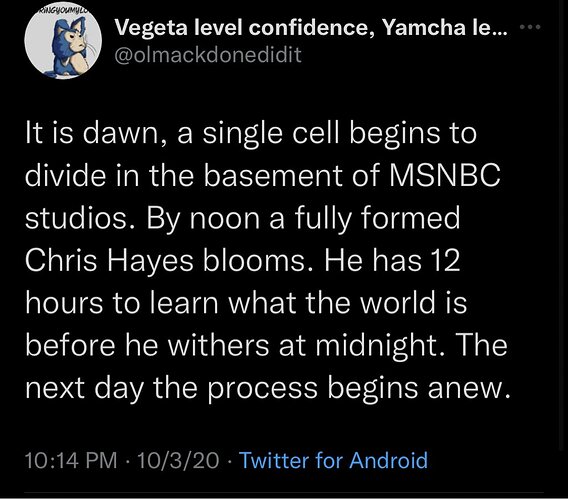
Healthcare in America… a listicle…
Reminds me of the role that turbo-folk played in Yugoslav wars in the 90s…
Ironic, in that the genre was created as a critique of right wing Serbian rural gangsta’ nationalism…
Ah yes, Spanish, that obscure language only spoken by around checks notes maybe sixty million people in the US.
I mean hell, we don’t even regard Americans as being able to speak English properly 

idk if this is the right thread for this, but they make a good point about how these shooters are usually known (to schools and police and sometimes mental health places) but nobody’s allowed to actually do anything. Unless it’s an immediate crisis.
Because involuntary commitment is difficult for very good reasons (the past history is full of them) and also you can’t just punish someone for the possibility that they might potentially do a crime in the future. So even if everybody knows that someone’s a potential threat, there’s nothing they can (legally) do until the person acts.
And what’s not said is, even if it were known, there’s no way to pull these people out of their situation and give them a different setting to relax and deal with their issues and refocus/rebuild to move forward.
But I guess that plays back to the previous. Even if we had a program in place, how do you justify yoinking someone out of their life and forcing them into an institutional program just because there’s a suspicion that sometime in the future they might commit a crime?
Why do the costs always have to be passed onto the consumer? Why can’t the shareholders be satisfied with less money? (I realize the latter question is a bit naive.)
Its not naive –– I ask this question all the time, out loud as often as possible.
Whenever there is a business - unpopular initiative, whether for the workers or the environment, or to raise taxes to pay for public programs, there is always a response that it will “cost jobs” or “raise prices”. The retort must always be - no, it will only decrease profits. They never mention that as if this is a ratchet that pulls in only one direction.
When confronted with a threat to their profits they will almost always plead you are being business unfriendly, or its not worth being in the business any more, and all these jobs will go away - more threats. Welcome them leaving the market and assure them there are many other entrepreneurs who would welcome the profit margin they are abandoning, and many more are skillful enough to increase profits even under this new tax rate.
These arguments are not hard to win, which is why they avoid having them.
Human greed was what I thought was responsible.
package shrinking is a very old game - I remember it from childhood, so eye-witness at least 50yrs ago.
Yah, half-gallon ice-cream is the first one I think of, down from 64 oz. to 48 oz.
And candy bars. Seems they go after the snacky foods. They’ve not shrunk the sizes of what are still considered staples - milk, eggs, butter, bread - just jacked up the prices.
It’s a good question. Economists call it price elasticity, or the lack of it. When there are only a few suppliers in a market, rises in costs are passed directly on to customers 1 to 1. The expectation of price hikes is also used to increase margin at the same time, so something of a positive feedback.
When there are many suppliers, rises in costs are not passed on as much. Suppliers are willing to cut margins to maintain volume. The ratio isn’t 1 to 1, but 1/2 or 1/3 or less. That’s what Adam Smith meant by a free market capitalism, not the current definition which I call “giving rich people whatever they want”.
And I understand rising costs of supplies, maintenance, paying off gov’t offici…uh, yeah. You know what I mean. But it’s the fucking shareholders…
Christ, that’s a fucked up story, especially the part about the woman’s father being the one to press charges, because “he did not approve of” their relationship… WTF?

